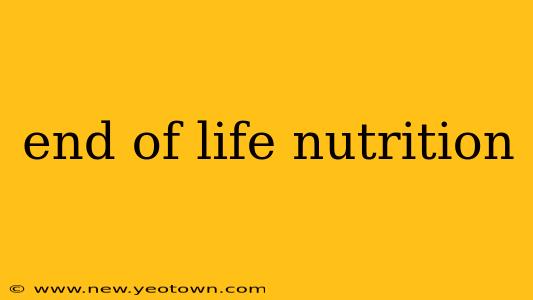The final chapter of life is a journey that touches every aspect of our being, and nutrition plays a surprisingly significant role in ensuring comfort and dignity during this time. While the thought of end-of-life nutrition can feel daunting, understanding the nuances can bring peace of mind to both patients and their loved ones. This isn't about prolonging life artificially; it's about enhancing quality of life in the precious remaining time.
This guide explores the complexities of nutrition at the end of life, addressing common concerns and offering a compassionate approach to this delicate subject.
What are the nutritional needs at the end of life?
This is a critical question, and the answer is highly individual. It's not about maintaining a specific calorie count or adhering to a strict diet plan. Instead, the focus shifts to managing symptoms and ensuring comfort. As someone nears the end of life, their appetite and ability to swallow may decrease significantly due to factors like fatigue, pain, and medication side effects. Therefore, the priority is providing nourishment that is both easily tolerated and provides essential nutrients to maintain energy levels and prevent further complications.
What are the different types of nutrition support near the end of life?
There are several options to consider, each tailored to the individual's needs and preferences. These might include:
-
Regular Diet: If the patient can eat and swallow comfortably, maintaining a regular diet with foods they enjoy is ideal. This could involve smaller, more frequent meals of nutrient-rich, easily digestible foods.
-
Modified Diets: As swallowing difficulties arise, modified diets like pureed foods or thickened liquids can help ensure adequate nutrition and hydration. A speech therapist can often assess swallowing capabilities and recommend suitable dietary modifications.
-
Nutritional Supplements: Oral nutritional supplements, available in various forms like shakes or drinks, can supplement a regular diet or act as a complete nutritional source if regular eating is challenging.
-
Enteral Nutrition: In cases where oral intake is significantly limited, enteral nutrition (feeding through a tube) can deliver essential nutrients directly into the stomach or small intestine. This option requires medical evaluation and often involves a healthcare team's guidance.
-
Parenteral Nutrition: In extremely rare situations where the digestive system cannot be utilized, parenteral nutrition (intravenous feeding) can provide essential nutrients directly into the bloodstream. This is a complex process typically employed only in intensive care settings.
How can I help a loved one maintain adequate hydration at the end of life?
Hydration is crucial for overall comfort and well-being. While the urge to drink may decrease, dehydration can worsen symptoms like fatigue and confusion. Offering small sips of water, juice, or ice chips frequently can make a significant difference. For those with swallowing difficulties, a healthcare professional can recommend methods for ensuring adequate hydration.
What are the signs that a person needs end-of-life care?
Recognizing the signs is crucial to ensuring appropriate support. These can include a significant decrease in appetite and fluid intake, increasing weakness and fatigue, changes in breathing patterns, and altered levels of consciousness. A healthcare professional can provide guidance in assessing the individual's needs and determining the appropriate level of care.
What are common misconceptions about end-of-life nutrition?
One common misconception is that forcing someone to eat or drink will prolong their life. In reality, this can be distressing and uncomfortable for the patient. The goal is comfort and dignity, not artificial life extension. Another misconception is that all patients require aggressive nutritional support. Often, the focus should be on managing symptoms and providing comfort, rather than aggressive interventions.
Is there a specific diet recommended for end-of-life care?
There isn't one specific diet; it's highly individualised. The focus is on providing easily digestible foods that the patient can tolerate and that offer essential nutrients. Preference and ability to consume should always guide choices.
What role do family and caregivers play in end-of-life nutrition?
The role of family and caregivers is invaluable. Their presence offers comfort and support. They can help the patient eat, provide encouragement, and ensure that the patient's preferences are respected and honored. Open communication with the healthcare team is vital to understanding the individual's needs and creating a compassionate care plan.
End-of-life nutrition is a deeply personal and sensitive subject. This guide provides general information; always consult with a healthcare professional for individualized guidance. The focus should remain on providing comfort, dignity, and respect during this challenging yet profoundly important time.

